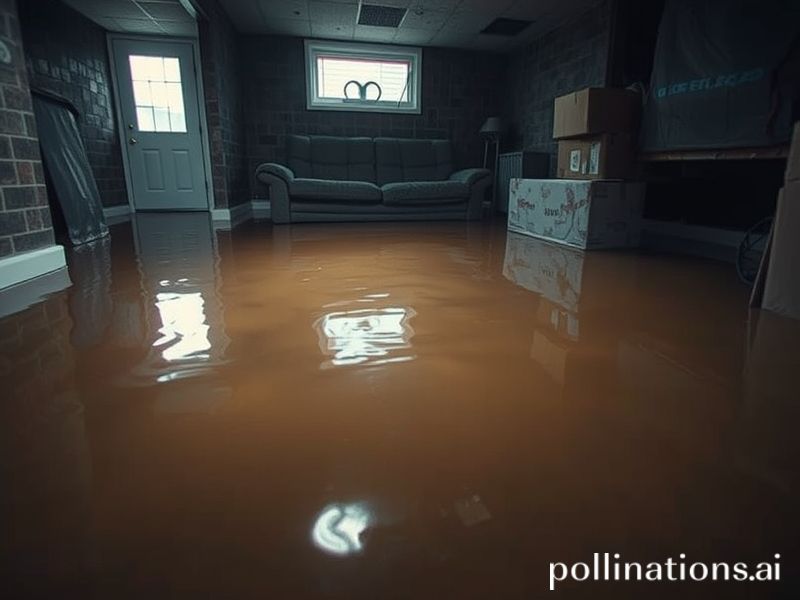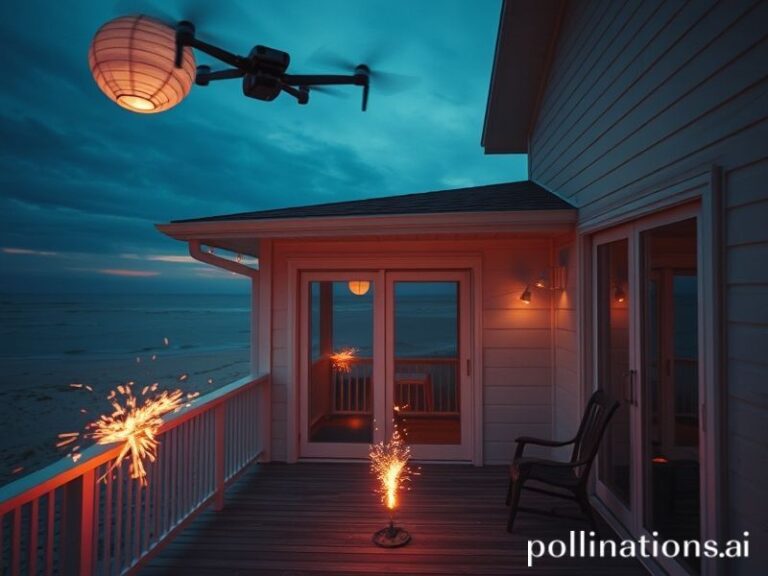Global Basement Flooding: The World’s Wettest Underground Revolution
Basement Flooding: The World’s Wettest Underground Revolution
By Our Correspondent, still drying his socks in five languages
GENEVA—While diplomats upstairs argue over carbon credits and whose submarine is parked in whose harbor, the planet’s true diplomatic channel is busy negotiating with gravity and faulty sump pumps. From Brooklyn to Bangladesh, the basement is flooding, and the water, like cheap vodka, respects no borders.
The numbers are almost cute—until you remember they’re measured in Olympic swimming pools. Last year Germans discovered 18 million cubic meters of unwanted “retrofitted pools” beneath their homes, a volume that could bathe every EU bureaucrat twice. Meanwhile, Chinese insurers report a 340 % spike in “underground water feature” claims, proving that even Marxist concrete can defect to liquidity. In Lagos, where basements are a status symbol akin to owning your own generator and conscience, the nouveau riche now hold dinner parties next to de-humidifiers the size of Panzer tanks. Nothing says “I’ve arrived” quite like caviar served with eau de storm sewer.
Why the synchronized global dunking? Start with the obvious culprit: weather that can’t decide whether it’s apocalypse or merely moody. Warmer air holds more water the way a dictator holds more territory—until it doesn’t. One cloudburst over Vienna last July dumped 90 mm in 60 minutes, turning the city’s historic cellars into expensive soup bowls. UNESCO is debating whether “underwater wine storage” counts as cultural heritage; the Austrians are too busy boating to their Riesling to answer.
Then there’s urban planning conceived on the back of a cocktail napkin. Jakarta, capital of a nation whose president has suggested moving the entire city, is sinking faster than the rupiah. Dutch engineers—history’s greatest wet-t-shirt contestants—have been flown in to advise, only to find the local water table so high it could qualify for frequent-flyer status. Their PowerPoint, titled “How We Kept Our Basements Dry Since 1570,” crashed when the projector itself began to float. Audience applause was muffled by galoshes.
Of course, technology promises salvation, or at least a subscription model. Silicon Valley start-ups now sell “smart” sump pumps that text you existential haikus (“I churn / therefore I am / also you’re screwed”) while Amazon’s newest Alexa skill can scream “BAIL!” in 47 languages. Early adopters in Miami’s Fontainebleau district beta-tested an AI that automatically lists your flooded home on Airbnb as “authentic underwater experience.” Guests receive complimentary snorkels and a waiver written in disappearing ink.
The geopolitical angle is equally moist. Russia’s new climate doctrine quietly reclassifies basement flooding as “internal migration,” allowing the state to relocate voters without admitting they’re climate refugees. In London, the Cabinet Office has rehearsed “Operation Thames Guppy,” a contingency where MPs escape through the Palace of Westminster’s newly aquatic gift shop. Should the water reach the House of Lords, tradition dictates they simply keep debating until buoyant.
Insurance companies, those romantic gamblers, have stopped flirting with the concept of “actuarial risk” and now speak of “actuarial certainty.” Lloyd’s of London recently added a clause excluding “water that has previously been someone else’s basement,” a metaphysical puzzle that has kept maritime lawyers in new yachts. Premiums in Sydney rose 800 % overnight, prompting residents to declare their cellars independent micronations with names like “The Republic of Dampistan,” thereby qualifying for foreign-aid umbrellas.
Yet beneath the mildewed carpet of tragedy lies the antique rug of human perseverance. In Mexico City, chinampa-inspired floating platforms now host art galleries where the installations are whatever the last storm left behind—last season’s hit was a soggy IKEA manual titled “How to Build a Future That Doesn’t Sink.” Critics called it “Brechtian bath-time.” Admission includes a free tetanus shot.
And so the water keeps rising, indifferent to GDP, ideology, or the fact that you just installed vinyl plank flooring advertised as “life-proof.” It trickles through the cracks of our grand narratives, reminding us that every empire—Roman, British, or your modest split-level ranch—ends up with the same finished basement: a dark, reflective space where you store the things you swear you’ll deal with tomorrow.
Until tomorrow floats past your ears, anyway.







